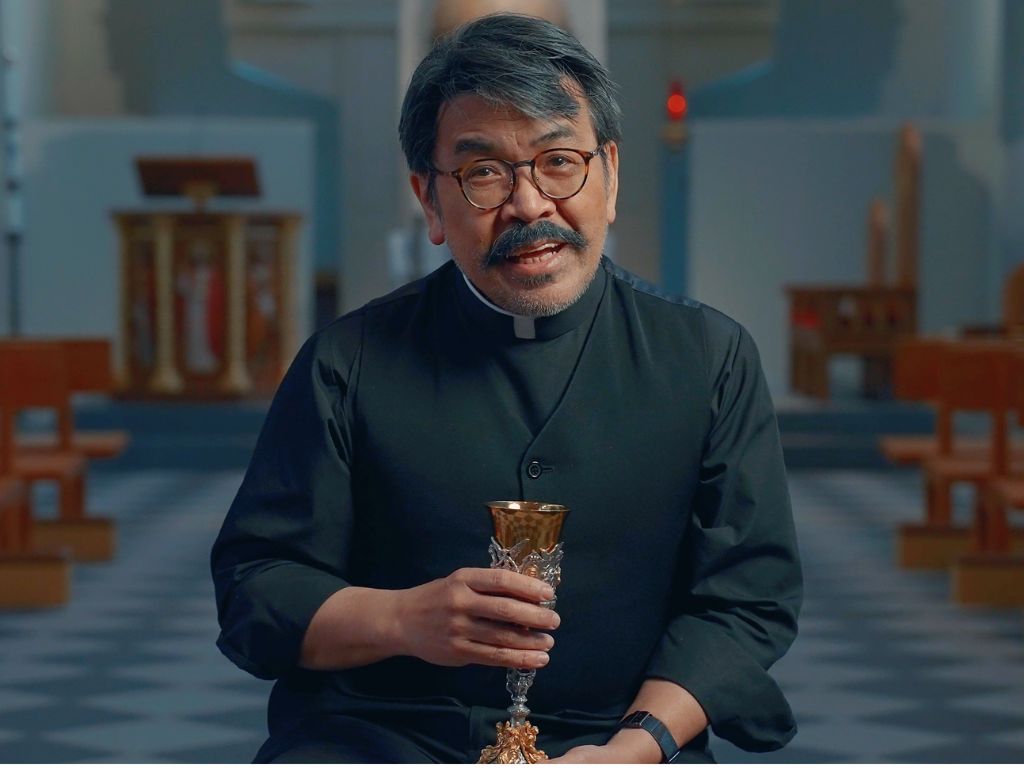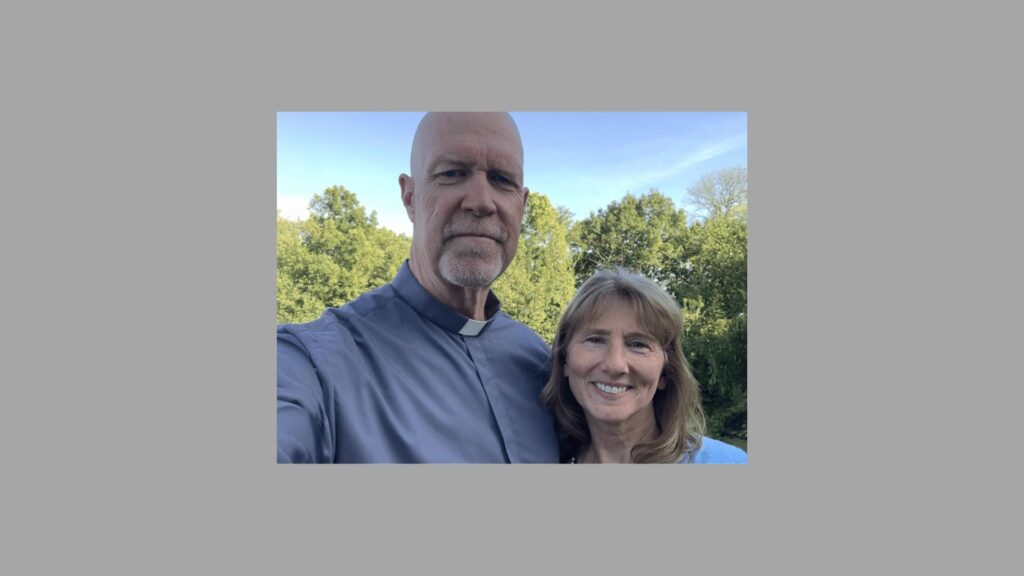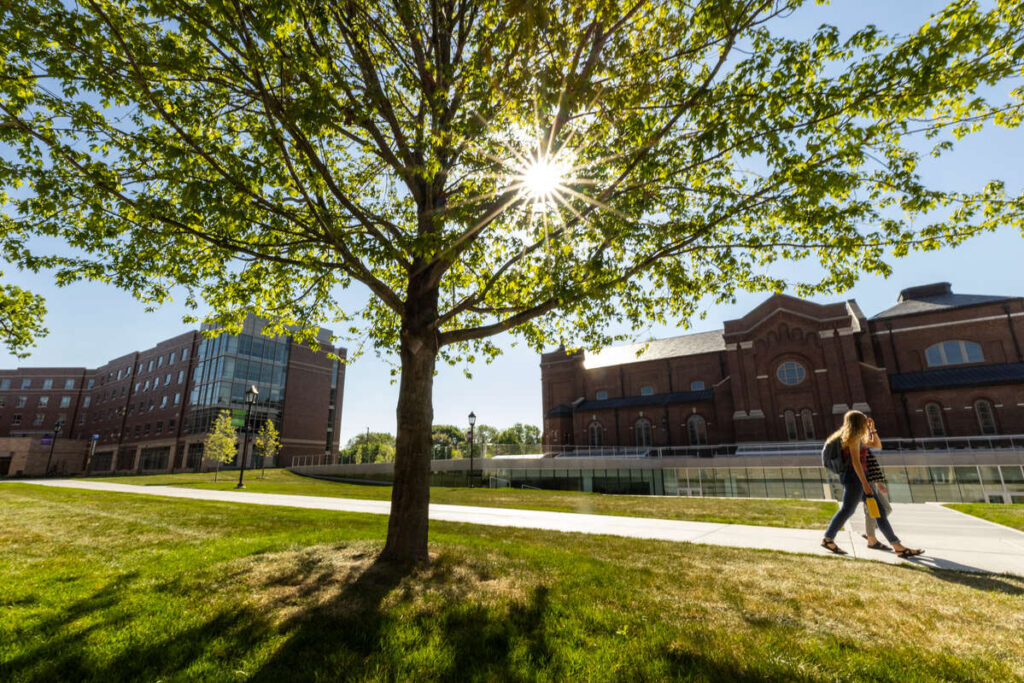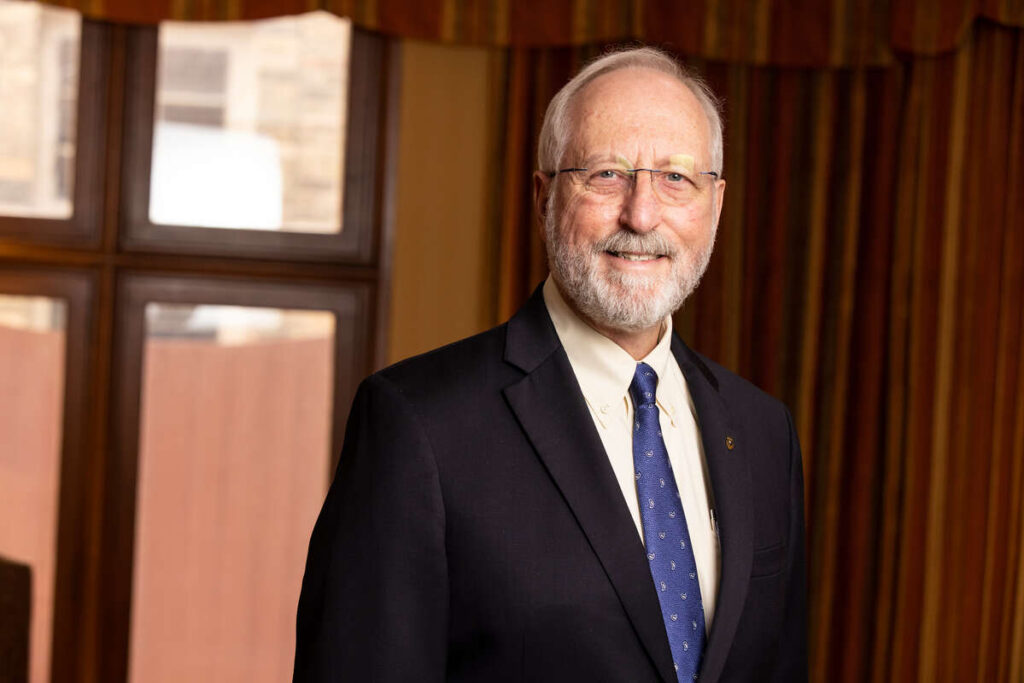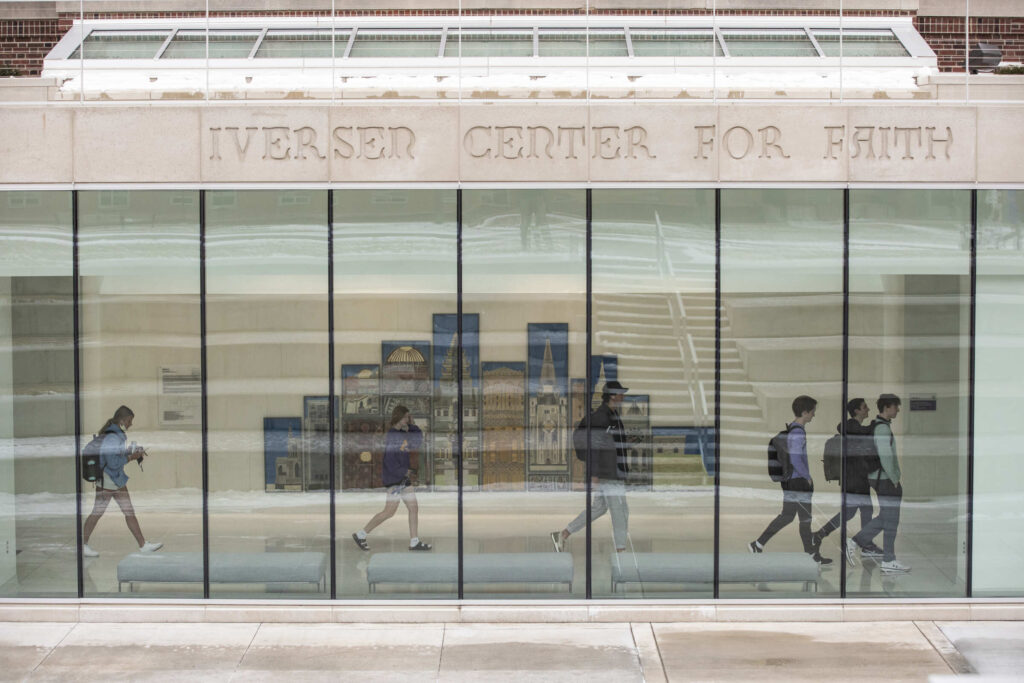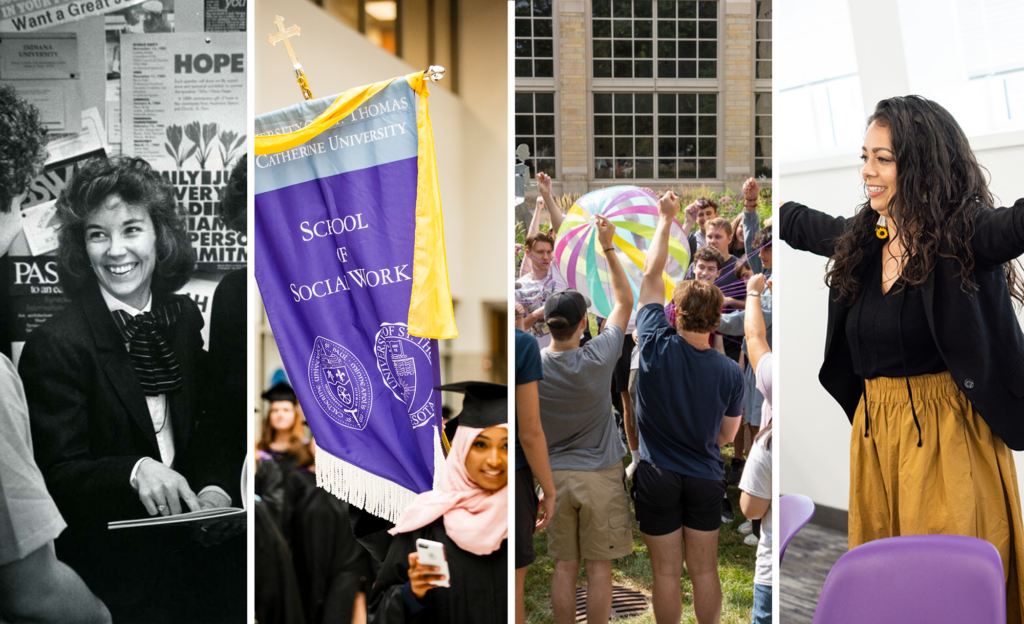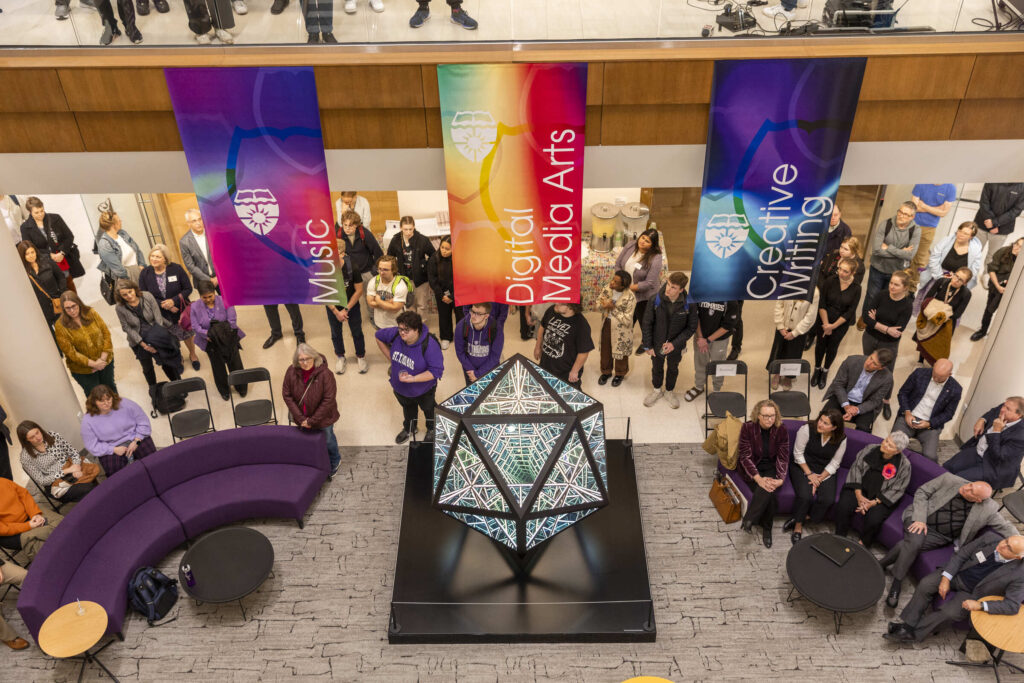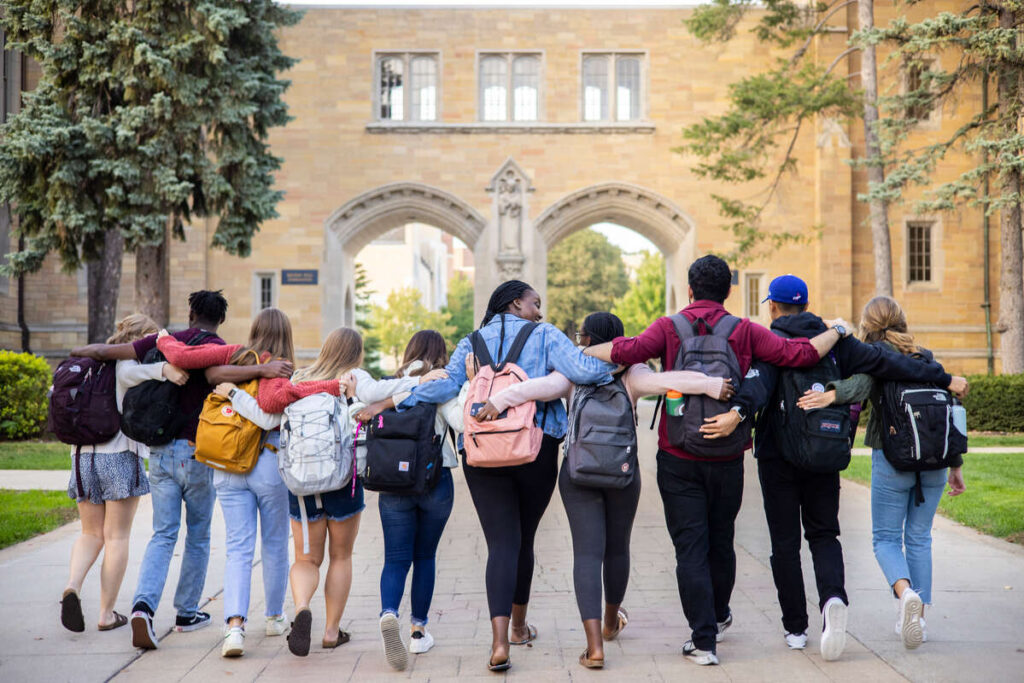Father Luisito Cabrera, Father Josh Miller and Father Frankie Floeder each embarked on unique and challenging journeys before embracing their call to the priesthood. Cabrera entered the priesthood at 62 after a winding, sometimes rocky road; Miller transitioned from a disciplined military career at West Point to serving God in a new capacity; and Floeder became the third priest in his family, continuing a legacy of religious vocations.
A grief observed, a plan fulfilled
Father Luisito Cabrera doesn’t look 62.
Maybe it’s his youthful, exuberant smile underneath a thick, handlebar mustache that features just a hint of gray. Or maybe it’s the fact he’s spent the past six years living, studying and praying with men whose parents are younger than him.
Either way, there’s an enthusiastic peace about the newest priest for the Diocese of Des Moines. Cabrera says this was always the plan.
“I’m not your traditional one,” Cabrera said. “But we’re all answering the same call to serve.”
Cabrera said he first heard that call as a teenager growing up in the Philippines. He initially discerned with the Salesians of St. John Bosco, joining their high school seminary at the age of 15. A few years later, Cabrera immigrated to New York City, spending some time with the Capuchin Franciscans.
But God ultimately called him to marriage, Cabrera said, and he ended up graduating from St. John’s University with a degree in communications and journalism.
Then he met Ruth Anne. Or Rae, as Cabrera calls her.
FATHER Luisito CabreraI’m not your traditional one. But we’re all answering the same call to serve.”
Originally from the south side of Des Moines, she had moved to New York City to pursue stage acting. The two dated for four years – which included Rae converting to Catholicism, with Cabrera as her confirmation sponsor – and got married at the Church of St. Francis Xavier in Manhattan.
“After you get married, you say, ‘Well, that’s it for my (priestly) vocation, right?’ It’s out the window,” Cabrera said. “God had other plans that I couldn’t see at the time. And my wife was meant to play a very, very important role in that vocation.”
From West Point to the priesthood
The son of a U.S. Army officer, Father Josh Miller always thought he might end up in the military himself someday.
Maybe not quite like this, though.
Ordained a priest of the Diocese of Winona-Rochester on June 8, Miller has his sights set on becoming a chaplain for the Archdiocese for the Military Services in the next few years. In some ways, it won’t be new territory; before entering the seminary, Miller spent five years as an Army field artillery officer.
“Recently, I’ve been reflecting back on when I started seminary, gosh, seven years ago – where I was then and what I was thinking the Lord’s plan for my life was,” Miller said. “Just getting into seminary was just a whole new adventure, and there’s kind of that same sense now.”
Miller grew up on a farm near Waseca, Minnesota.
After graduating from Waseca High School, he attended the U.S. Military Academy at West Point.
Miller didn’t see combat during his half decade leading an artillery platoon. But he was stationed in Japan and South Korea for joint training exercises with both Asian U.S. allies.
“It was a call to service,” Miller said. “I wanted to do something that had a mission, that was going to make a difference in the world.”
That desire has never subsided.
As an officer coming out of West Point, Miller was immediately placed in charge of dozens of soldiers. Some of them were much older than him. Some had fought in Iraq and Afghanistan.
“Over and over, I would recognize ‘these guys don’t need a boss; they need someone to talk to,’” Miller said. “I thought I was going to be in the Army to be a field officer and be a leader; maybe I’m called to something else.”
FATHER Josh Miller, Diocese of Winona-RochesterIt was a call to service. I wanted to do something that had a mission, that was going to make a difference in the world.”
Miller first attended Mundelein Seminary in Illinois before transferring to The Saint Paul Seminary this year. He’ll spend his first few years as a priest in a parish setting, with plans to transition to military chaplaincy after that.
“One of the things that I’ve grown to love since entering seminary – especially being out in public wearing a collar – people will come and ask you to pray for them,” Miller said. “They’ll really share with you some very personal struggles with the Lord, with their family, with health stuff, all kinds of things. It’s happening multiple times where I don’t know this person very well and they’re sharing their heart with me. … As a deacon, you can pray for them in that moment and afterward, but I’m so excited to bring the power of the sacraments into people’s lives.”
Meet the Floeders
Father John Floeder is quick to point it out: “Our family is far from perfect.”
Yes, even a clan with five religious vocations and counting has its disagreements, drama and disappointments. But a common thread amid the chaos, he said “is that we’re trying to say ‘yes’ to the Lord. And then we’re trying to encourage one another as we do that.”
When Deacon Francis “Frankie” Floeder became Father Frankie in May, he followed in the footsteps of his uncle Father John, director of human formation and the propaedeutic stage program at The Saint Paul Seminary, and older brother Father Louie, a fellow seminary alumnus and pastor of the Church of St. Dominic in Northfield, Minnesota. Another uncle, Tony, is currently a permanent deacon candidate at the seminary’s Institute for Diaconate Formation.
A cousin, Sister Maddie Shogren, became the first woman to take temporal vows with Pro Ecclesia Sancta outside Peru, where the religious order was founded.
“(God) chooses to have different people in different roles for the building of the kingdom,” Father Frankie Floeder said. “That’s something I’ve been really inspired by is just seeing how all of our siblings are pursuing the Lord in whatever it is they’re being called to. A number of my brothers and sisters are married, they have families, they have their careers. God’s calling my brother who’s a dentist to be a saint. He’s calling my brother who’s an engineer to be a saint. He’s calling my brother in high school to be a saint. There’s just this encouragement to do whatever God is calling you to do.”
The Floeders, most of whom live in the Twin Cities, trace some of their roots to Germany. “That comes with a lot of work ethic, a lot of discipline,” said Father Louie Floeder, who celebrated his fifth ordination anniversary this spring.
Father Louie and Father Frankie are two of 10 children; their mother comes from Peru, so there’s some “Latina flair” in the mix, too, Father Louie said.
Being in such a large family taught them the meaning of self-sacrifice and working together as a team.
“We learned a lot of natural virtues,” Father Louie said, “not because we’re naturally virtuous, but because of our large family size and the need for patience and sharing and cooperation.”
Faith wasn’t part of it. It was it. Sunday Mass was a nonnegotiable. The family practiced special in-home devotions during Advent and Lent. Sunday mornings before and after Mass were spent discussing Church history or that day’s homily. Priests and religious brothers and sisters were frequent dinner guests.
FATHER Louie FloederWe learned a lot of natural virtues, not because we’re naturally virtuous, but because of our large family size and the need for patience and sharing and cooperation.”
Father John Floeder grew up in a similar environment. It was his brother and sister who first encouraged him to become devoted to prayer.
Today, Father John Floeder shares that same message with seminarians during their first year, called the propaedeutic stage, where they engage in deep prayer, contemplation, psychological counseling, community life and works of service while fasting from electronic media.
“If you look at my extended family, about 30 years ago, I don’t think anyone could have predicted that our family would be this way,” Father John Floeder said. “What it took was, I think, God breaking into the hearts and the lives of some of my siblings in a really powerful way. As a younger man to watch them be growing in their own faith, that inspired me then as I tried to imitate them.”
So how does one go about raising a family where men and women are so predisposed to hearing God’s call?
- There’s no magic formula, but the Floeders offer this advice from their experience – both in their families as well as in ministry:
- Eat dinner together as a family – no matter what.
- Be aware of God’s call to “heroic holiness” – even if you or your loved ones are struggling. That even includes straying from the faith. According to Father Louie, “We do the best we can, and then we trust that the Lord is the Good Shepherd. And that when I stray, he’s gonna find me and bring me back. And when my kids are having difficulties that he’s there to comfort them.”
- Set a good example. “For parents, you need to live the type of faith that you want your kids to have,” Father John Floeder said.
It’s not an easy life. But it is a fulfilling one. Go to one of the Floeders’ extended family gatherings, and you’ll see it.
“They’re loud,” Father Louie Floeder said with a smile. “Very joyful. There’s this kind of wild pandemonium.
“You never know what you’re going to get when you walk in the door.”
Editor’s Note: A version of this story originally ran on The Saint Paul Seminary website, which is located at the University of St. Thomas.
